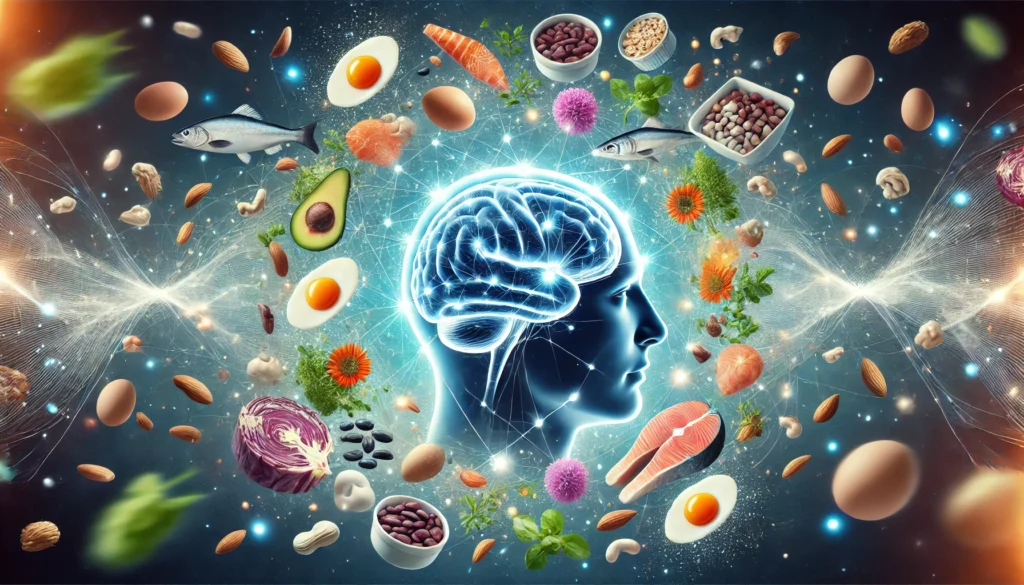To comprehend how protein affects the brain, it’s essential to understand the basic biology. Proteins are composed of amino acids, which are vital for numerous physiological processes, including the synthesis of neurotransmitters. Neurotransmitters are chemicals that facilitate communication between neurons, playing a crucial role in regulating mood, memory, and cognitive function.
You may also like: Memory-Boosting Foods You Should Try Today
The Role of Amino Acids
Amino acids serve as the building blocks for neurotransmitters such as dopamine, serotonin, and norepinephrine. Each of these chemicals has distinct functions: dopamine is associated with reward and motivation, serotonin with mood regulation, and norepinephrine with attention and response actions. A diet rich in protein ensures a steady supply of these amino acids, thus supporting optimal brain function.
Neurotransmitter Synthesis and Protein Intake
The synthesis of neurotransmitters is directly influenced by the availability of amino acids. For instance, tryptophan is a precursor to serotonin, and its availability can impact mood and cognitive function. Consuming protein-rich foods can enhance the synthesis of these neurotransmitters, promoting mental well-being and cognitive sharpness.
Protein’s Impact on Brain Plasticity
Brain plasticity, or the brain’s ability to adapt and reorganize itself, is crucial for learning and memory. Proteins provide the structural components necessary for this adaptability. Amino acids like glutamate play a role in synaptic plasticity, which underpins learning and memory formation, highlighting the importance of protein in cognitive development.
Historical Context of Dietary Protein
Historically, protein has been recognized as a cornerstone of human nutrition. Ancient civilizations, including the Greeks and Romans, emphasized the consumption of protein-rich foods like meat and legumes to enhance physical and mental performance. This historical context underscores the longstanding belief in the power of protein to support cognitive health.
Cultural Perspectives on Protein Consumption
Different cultures have varied perspectives on protein consumption. In ancient China, scholars advocated for a balanced diet with sufficient proteins to maintain intellectual prowess. Similarly, Ayurvedic practices in India have long recognized the importance of legumes and dairy in promoting mental clarity. These diverse cultural insights illustrate the universal recognition of protein’s role in cognitive health.
Evolutionary Significance of Protein
From an evolutionary standpoint, protein consumption has been linked to the development of the human brain. As early humans incorporated more protein into their diets, there was a corresponding increase in brain size and complexity. This suggests that protein-rich diets have been integral to our cognitive evolution.
Protein in Traditional Medicine
Traditional medicine systems have always valued protein for its health benefits. In ancient Greek medicine, protein was believed to balance bodily humors, impacting mental faculties. Similarly, traditional Chinese medicine emphasizes the role of protein in maintaining energy flow and cognitive function, highlighting its enduring importance across time.
Current Trends in Protein Consumption
In today’s fast-paced world, there is a growing emphasis on diets that prioritize brain health. The biohacking community, in particular, has championed the use of protein-rich diets to boost mental acuity and memory. This trend aligns with contemporary scientific findings that suggest a positive correlation between protein intake and cognitive performance.
Protein and Modern Brain Function
Recent studies have demonstrated that protein consumption can positively impact brain function. For instance, research published in the “Journal of Nutrition” indicates that individuals who consume adequate levels of protein exhibit better memory recall and faster cognitive processing than those who consume less protein. These findings suggest that a diet rich in protein is beneficial for maintaining and enhancing memory.
Biohacking and Protein
Biohacking, a movement focused on optimizing human performance through dietary and lifestyle changes, has embraced protein as a key component. Enthusiasts often experiment with protein timing, such as consuming protein before mentally demanding tasks, to enhance focus and productivity. This trend highlights the innovative ways individuals are using protein to support cognitive performance.
Protein Supplements and Brain Health
With the rise of health supplements, protein powders and bars have become popular for their convenience and efficacy. These supplements provide a quick and efficient way to increase protein intake, supporting cognitive health on-the-go. However, it’s essential to choose high-quality supplements to ensure optimal brain benefits.

Trends in Plant-Based Proteins
The increasing popularity of plant-based diets has led to a surge in plant-derived protein sources. Foods like pea protein, hemp, and chia seeds are gaining attention for their brain-supporting properties. This shift towards plant-based proteins reflects a growing awareness of sustainable and health-conscious eating.
Practical Dietary Recommendations
For those looking to enhance their memory through diet, incorporating a variety of protein-rich foods is key. Here are some practical recommendations:
Lean Meats
Lean meats such as chicken, turkey, and beef are excellent sources of high-quality protein. They provide essential amino acids necessary for neurotransmitter production and brain health.
The Benefits of Poultry
Poultry, including chicken and turkey, is not only rich in protein but also contains other vital nutrients such as B vitamins and zinc. These nutrients work synergistically with proteins to enhance cognitive function and energy metabolism, making poultry a valuable addition to a brain-boosting diet.
Incorporating Red Meat
While lean red meats like beef are often associated with physical strength, they also play a role in cognitive health. Red meat provides iron, which is crucial for oxygen transport to the brain, thereby enhancing alertness and memory. Incorporating moderate amounts of lean red meat can support overall brain vitality.
Fish and Seafood
Fish, particularly fatty fish like salmon and mackerel, are rich in omega-3 fatty acids, which complement protein intake by supporting brain structure and function. Omega-3s are known to reduce inflammation and support synaptic plasticity, enhancing memory and cognitive function.
The Role of Omega-3s in Brain Health
Omega-3 fatty acids, found abundantly in fatty fish, are integral to maintaining the fluidity and flexibility of brain cell membranes. This fluidity is essential for efficient neurotransmitter function and communication between neurons, thereby supporting cognitive processes such as learning and memory.
Variety in Seafood Choices
To maximize brain benefits, it’s beneficial to incorporate a variety of seafood into your diet. Shellfish, for example, are rich in zinc and iodine, both of which are essential for cognitive function. Exploring different seafood options can provide a diverse range of nutrients that support brain health.
Plant-Based Proteins
For those following vegetarian or vegan diets, plant-based proteins such as beans, lentils, quinoa, and tofu offer substantial amounts of protein. These foods also contain other nutrients that support brain health, such as fiber, vitamins, and minerals.

The Nutritional Power of Legumes
Legumes, including beans and lentils, are not only protein-rich but also high in fiber and antioxidants. These nutrients help maintain stable blood sugar levels, providing a steady energy supply to the brain, which is crucial for sustained mental focus and cognitive performance.
Quinoa: A Complete Protein
Quinoa is unique among plant-based foods because it contains all nine essential amino acids, making it a complete protein. This quality makes quinoa an excellent choice for those seeking to support brain health through a plant-based diet, as it provides a balanced amino acid profile.
Dairy and Eggs
Dairy products and eggs are also valuable sources of protein. Eggs, in particular, contain choline, a nutrient crucial for brain health and memory enhancement.
The Role of Choline in Cognitive Function
Choline, found abundantly in eggs, plays a vital role in the synthesis of acetylcholine, a neurotransmitter involved in memory and learning. Adequate choline intake is associated with improved cognitive performance, making eggs a brain-friendly food choice.
Dairy for Cognitive Support
Dairy products, such as milk and cheese, provide not only protein but also calcium and vitamin D, which are essential for brain function. These nutrients support neurotransmitter release and neuroplasticity, highlighting the cognitive benefits of including dairy in your diet.
Future Implications and Research Directions
As science continues to explore the intricacies of brain and protein interactions, the potential for dietary interventions to support cognitive health grows. Future research may uncover more precise mechanisms by which protein influences brain function, potentially leading to targeted dietary recommendations for cognitive enhancement.
The Role of Personalized Nutrition
With advances in genetic and nutritional science, personalized nutrition is becoming more feasible. Understanding individual differences in protein metabolism and cognitive function could lead to tailored dietary interventions that maximize brain health benefits.
Nutrigenomics and Protein
Nutrigenomics, the study of how genes interact with nutrients, is paving the way for personalized dietary recommendations. By analyzing genetic markers related to protein metabolism, researchers can develop customized nutrition plans that optimize cognitive health based on an individual’s genetic profile.
Emerging Research on Protein and Cognition
Ongoing research continues to investigate the complex relationship between protein and cognitive function. Studies are exploring how different types and sources of protein affect the brain, as well as the long-term impacts of protein-rich diets on mental health. These findings will help refine dietary guidelines for cognitive enhancement.
The Future of Protein Supplements
As the demand for cognitive-enhancing supplements grows, the development of specialized protein products is on the rise. Future innovations may focus on optimizing amino acid compositions to target specific cognitive functions, such as memory retention or attention, offering new possibilities for brain health support.

Conclusion
The connection between protein-rich foods and enhanced memory is grounded in both historical context and modern scientific research. By incorporating a variety of protein sources into their diets, individuals can support neurotransmitter synthesis, improve cognitive function, and potentially enhance memory. As our understanding of the brain-protein relationship evolves, so too will our ability to optimize brain health through nutrition. For those invested in health and wellness, embracing a protein-rich diet may be a powerful strategy for sustaining mental acuity and cognitive vitality.
Further Reading:
How To Get Enough Protein In A Brain-Healthy Diet
14 Amino Acid and Protein Requirements: Cognitive Performance, Stress, and Brain Function
Alzheimer’s: Studying a New Protein Inspires Hope
Important Note: The information contained in this article is for general informational purposes only, and should not be construed as health or medical advice, nor is it intended to diagnose, prevent, treat, or cure any disease or health condition. Before embarking on any diet, fitness regimen, or program of nutritional supplementation, it is advisable to consult your healthcare professional in order to determine its safety and probable efficacy in terms of your individual state of health.
Regarding Nutritional Supplements Or Other Non-Prescription Health Products: If any nutritional supplements or other non-prescription health products are mentioned in the foregoing article, any claims or statements made about them have not been evaluated by the U.S. Food and Drug Administration, and such nutritional supplements or other health products are not intended to diagnose, treat, cure, or prevent any disease.


